
Building for Equity:
New Initiatives and Board Members at TCP
As we leap feet first into the new year, I want to express how excited we are at The Children’s Partnership for what’s to come in 2024. With the launches of new initiatives, including our Peer-to-Peer Youth Mental Health High School Pilot Demonstration (the first of its kind overseen and implemented by TCP!) and our participation in the new Housing Justice as Health Equity Collaborative, as well as several new team members, TCP is poised to tackle even more in our commitment to advancing health equity for California’s children.
I would also like to welcome two new members to TCP’s Board of Directors:
- Darielle Blevins brings a wealth of early childhood equity expertise as an assistant research professor with the Children’s Equity Project, a research and policy center with over 25 partners.
- Jessica Huey joins the board with nonprofit fiscal management savvy as a director at BDO Nonprofit & Grantmaker Advisory, which helps nonprofits and foundations build the capacity they need to fulfill their missions.

As we welcome Darielle and Jessica, we want to thank Shari Davis, Tamara Powers and Ken Chawkins for their guidance and support as members of the TCP Board of Directors. Shari and Tamara are two of TCP’s founding board members. Their dedication and vision have been instrumental in the success and growth of our organization, including our unwavering commitment to racial justice and child health equity. All three board members and their committed efforts, strategic insights and expertise provided TCP a strong foundation for our mission and objectives.
We are forever grateful for the time, energy and resources they have generously invested in our success.
Working hand in hand with our invaluable partners, we look forward to making more progress this year in child health equity through policy, research and community engagement. Here’s to a fruitful 2024!
Berenice Nuñez Constant
Chair, The Children’s Partnership Board of Directors

The Governor’s January 2024 Budget Proposal:
Our Response
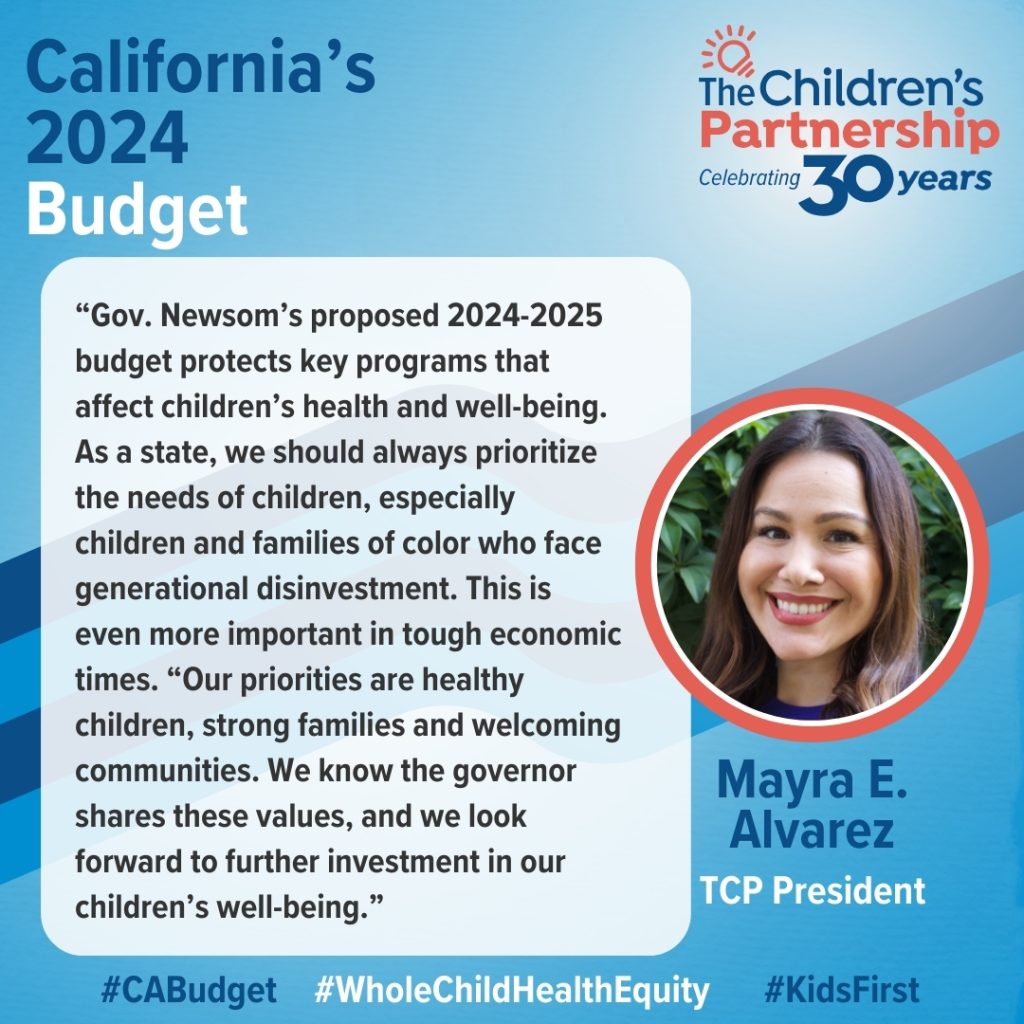
In anticipation of a budget shortfall, we urged Gov. Newsom to prioritize children’s health with a comprehensive whole-child health equity approach. We appreciate the governor’s commitment to child and youth mental health, including a new Medi-Cal benefit for wellness coaches, and California’s broadband infrastructure. Despite these efforts, more is needed for the health and well-being of children in our state.
We are advocating for immediate implementation of continuous Medi-Cal coverage for young children, increased reimbursement rates for community health workers, and the permanence of federal unwinding flexibilities. Additionally, we emphasize the importance of timely access to mental health appointments, expanding the California Food Assistance Program, supporting affordable housing, and expanding unemployment benefits – addressing the entire continuum of supports children and families need to thrive.

Peer-to-Peer is Finally Here!

The Children’s Partnership, in collaboration with the California Department of Health Care Services, is pleased to announce the launch of the Peer-to-Peer Youth Mental Health High School Pilot Demonstration request for applications!
We invite California high schools to submit applications for this historic investment in youth mental health. We are committed to a collaborative partnership with eight individual high school grantees, identifying best practices for peer-to-peer programs that can be implemented statewide and serve as a model for national efforts. Ultimately, this effort will strengthen our advocacy for sustainable funding and infrastructure for youth-driven peer-to-peer programs in California.
The application deadline is Friday, March 22, 2024, at 11:59 p.m.
Missed our last Peer-to-Peer webinar? Check it out here.
#KeepKidsCovered: Sign On to Share Your Support
On Jan. 12, the Department of Health Care Services released its draft request for federal approval to implement multi-year continuous Medi-Cal coverage for children ages 0 to 5. This policy protection, adopted in the 2022/23 state budget, would allow young children to keep their Medi-Cal coverage without disruption or gaps and without having to annually renew that coverage. Before the Department submits this waiver proposal to the federal Medicaid agency, they must seek public comment. We are asking all our partners to share their support for this children coverage protection with the Department as part of this public comment period. Comments are due Feb. 12. Details for submitting comments can be found here.
If you would like to sign on to our coalition public comment letter, review the letter and sign on here. The deadline for signing is Feb. 9.
#KeepKidsCovered: Spread the Word
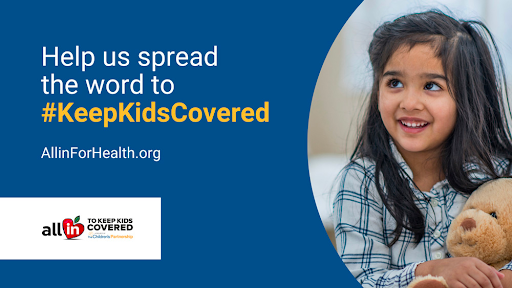
The Children’s Partnership and their ALL IN partners are proud to offer this toolkit to schools, early care and education providers and other child champions. The ALL IN to #KeepKidsCovered Community Outreach Toolkit helps California families get information about Medi-Cal renewals, and the outreach videos star community health workers who serve diverse communities and speak to families in their native languages, including English, Spanish, Punjabi, Tagalog and Cantonese Chinese.
Share this content and help spread the word about Medi-Cal renewals by downloading or linking to them on social media, in newsletters or on your website!

Blog: Safeguarding Stability: Continuous Coverage for Children with Special Needs
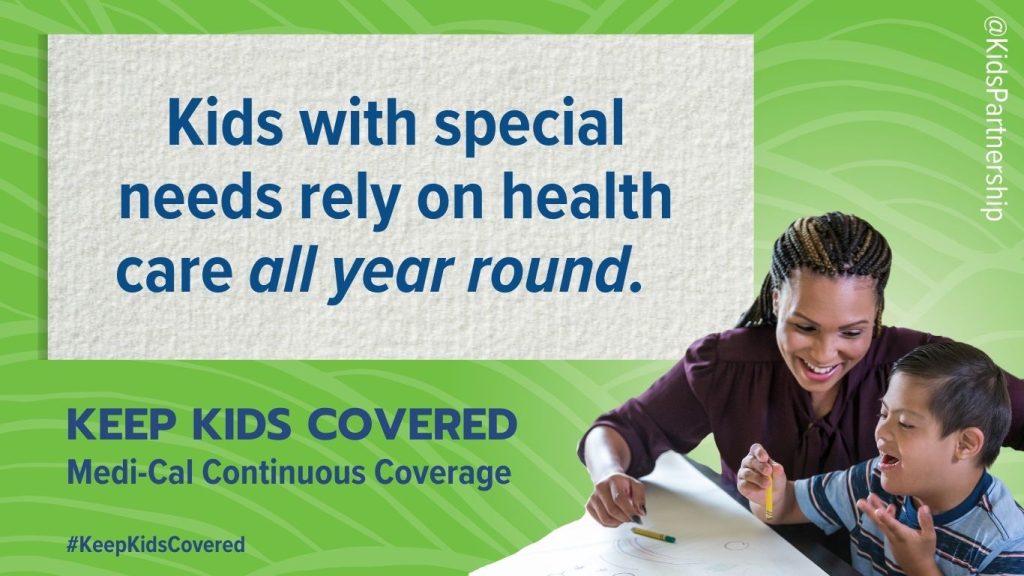
In the wake of a nationwide push to renew Medicaid coverage, a troubling number of California children lost vital health coverage. The renewal hurdles for Medi-Cal hit families of children with special health care needs the hardest. Shockingly, 21% of families reported a loss in coverage for their children. This disruption not only imposes financial strain but also delays crucial interventions for these families, underscoring the immediate need for more accessible and efficient processes and continuous coverage protection.
Even brief lapses in coverage can lead to delays in early detection and interventions. Medi-Cal additionally supports families by enabling a family member to be a full-time caregiver through In-Home Supportive Services (IHSS), offering financial assistance. Losing Medi-Cal coverage for a child can significantly impact a family’s economic stability, particularly when the caregiver can’t work due to their child’s health needs.
It’s time for the governor to jumpstart the state’s continuous coverage policy so our youngest children are not left behind. Public programs should work for the public. Let’s keep kids covered.
Learn more in our joint blog with Family Voices.
Launch of the Housing Justice as Health Equity Collaborative
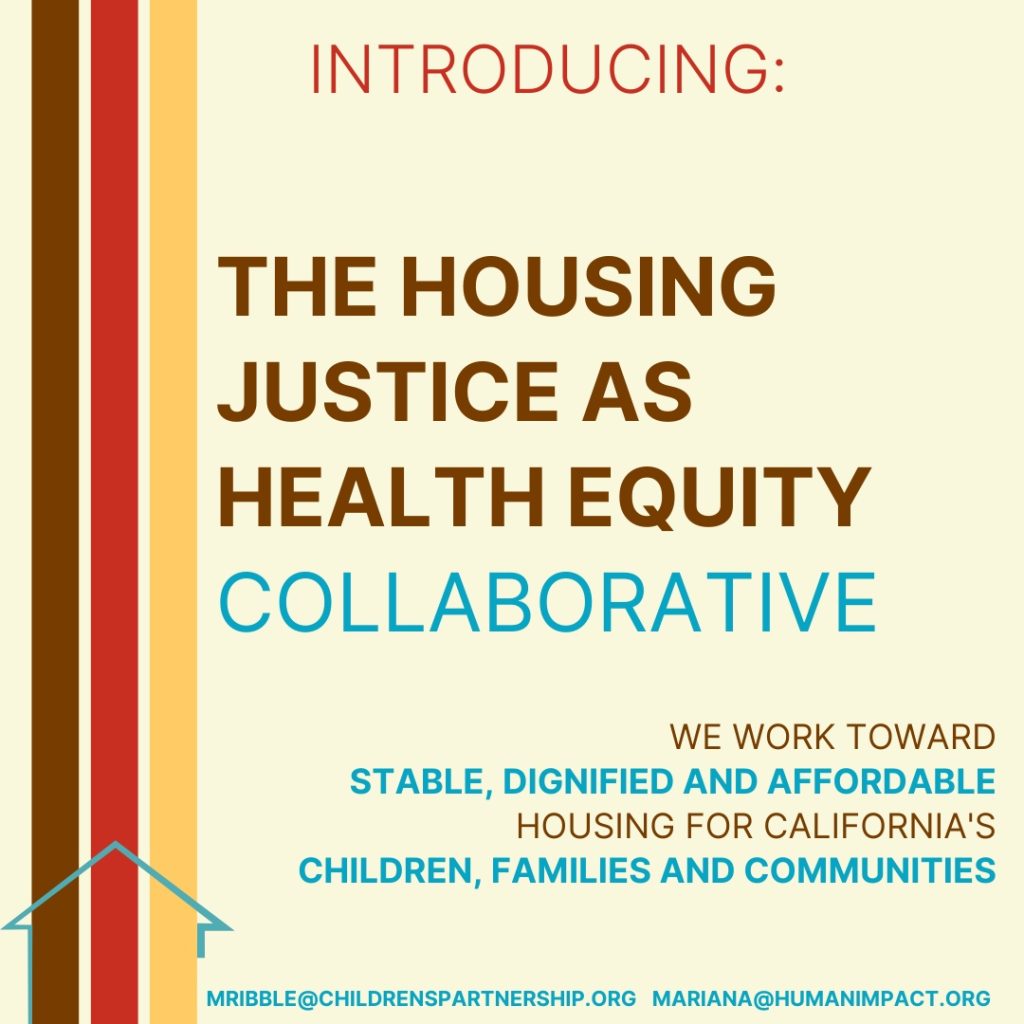
TCP, together with our collaborators at Human Impact Partners, recently launched the new Housing Justice as Health Equity Collaborative.
The Collaborative is a network of organizations and community leaders from the California health sector working to improve access to stable, dignified and deeply affordable housing as a core social driver of health for California’s children, families and communities.
The Collaborative aims to better leverage the untapped influence of the health sector in solidarity with the priorities of grassroots, BIPOC-led housing justice organizations that work directly with families of color across California facing housing insecurity. Together, the Collaborative will:
- Build the capacity of its health sector organizations and community leaders to advance housing justice through state and local policy
- Shift narratives related to housing injustice to center health equity and racial justice and uplift the voices of impacted residents
- Mobilize together with other housing justice advocates and tenant rights organizations to build community power
Learn more about the Collaborative’s values and activities here, and click here to get involved!
LA City Council Adopts First-in-the-Nation Policy to Tackle Digital Discrimination
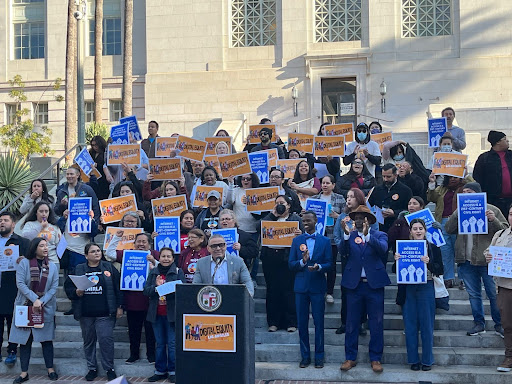
Caption: On Dec. 12, 2023, TCP joined impacted residents, DELA partners and Councilmember Marqueece Harris-Dawson at a rally on the steps of Los Angeles City Hall to push for action on digital discrimination. Councilmembers Bob Blumenfield, Eunisses Hernandez and Imelda Padilla also joined the rally to show their support.
On Jan. 24, Los Angeles City Council unanimously passed a first-in-the-nation ordinance to directly address digital discrimination as part of its efforts to close the digital divide, making internet access easier for low-income families of color. Please join us in amplifying this victory using this social media toolkit.
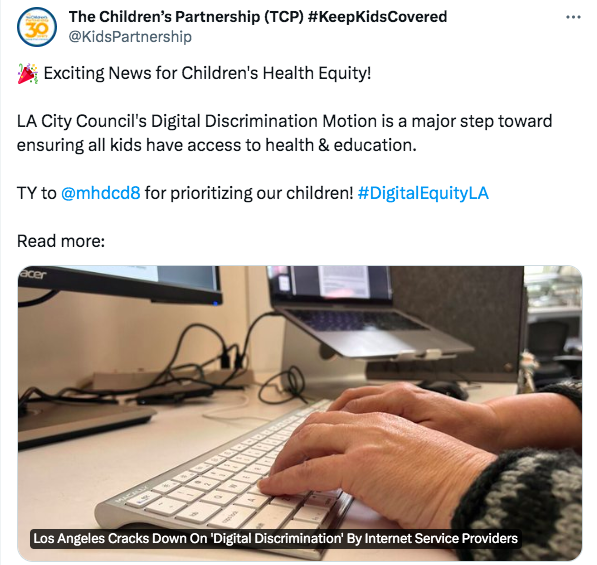
Together with our allies in the Digital Equity LA (DELA) Coalition, TCP has been calling for the city to take bold action to address ways in which internet service providers routinely charge higher prices for slower service in low-income communities of color, compared to more affluent and predominantly white communities.
This is a priority for TCP because digital equity is a core social driver of health. The systems crucial to the well-being of our families are increasingly dependent upon digital infrastructure: schools and learning, doctor visits and health care services, skills training, housing and job applications, workforce development resources, and more. But as a result of persistent structural racism, children from BIPOC communities have been disproportionately impacted by digital inequities, contributing to worse health outcomes compared to their white peers. The ordinance paves the way for new and effective action to define, prevent, identify and remedy discrimination in access to critical broadband services across the city of Los Angeles. The ordinance is modeled off a new groundbreaking definition of digital discrimination from the Federal Communications Commission that for the first time focuses on disparate impact and does not require proof of intent to discriminate.
ICYMI: Let’s Talk Webinar Series Recordings
TCP and our partners in ALL IN For Health hosted a four-part series of webinars to inform and empower California’s children, youth and families on issues that impact their health and well-being. The Let’s Talk series brought together expert partners from across California to provide families with important information on pressing issues, such as health access, resources, and important benefits available to children and their families.
Did you miss any of the previous Let’s Talk webinars? Don’t worry! All of the Let’s Talk webinars are available to watch on the ALL IN For Health website.
Child Care Resource Center Panel
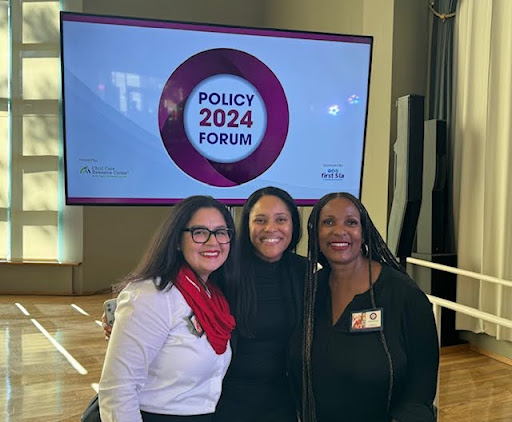
On Jan. 5, The Children’s Partnership joined the Child Care Resource Center’s 2024 Policy Forum to discuss the state of family well-being across California’s diverse families and communities. Eva Rivera, TCP’s Policy Director for Early Childhood Development, joined a panel of statewide experts to explore potential family- and community-centered policies and strategies to ensure all have equitable access to supportive services, programs and resources.
Community Health Worker Webinar
On Jan. 18, TCP President Mayra E. Alvarez lent her expertise as a panelist for a webinar, “The Role Community Health Workers Can Play to Improve Maternal Mental Health,” hosted by the Funders for Maternal Mental Health and Grantmakers in Health.
The panelists explored challenges to greater integration of community health workers in Medicaid and other public financing mechanisms to ensure thriving wages, high quality care and workforce development strategies.
Alvarez emphasized the pivotal role of community leadership that community health workers, promotoras and representatives (CHW/P/R) play, underscoring the opportunity to reshape the health care system to better serve diverse communities. TCP is a proud steering committee member of the CHW/P/R Coalition, which is dedicated to ensuring the needs of California’s diverse CHW/P/R workforce are addressed and members are able to actively participate in policymaking processes related to the future of their workforce.
Whole Child Equity Partnership Retreat
On Jan. 18-19, TCP, with co-chair Catalyst California and California partners, attended the 2024 Whole Child Equity Partnership (WCEP) retreat in Los Angeles. The partnership’s members discussed and tackled some of the biggest issues facing California’s children, while framing the discussions and priorities around our commitment to uplift pro-Black policies in economic security, health care and child care. The two-day retreat closed with each workgroup having a solid foundation for their work over the next year.
WCEP member Debra Watkins from A Black Education Network reflected on the foundations and ongoing progress of this partnership before ending the retreat, leaving many inspired and dedicated to contributing to WCEP’s pro-Black framework.
“I have been thinking about the promise of this initiative, and this initiative can become a model for the way that others engage in pro-Black work. This is the promise of this partnership. It’s a multicultural coalition,” Watkins said. “Four years ago, some of us met in Sacramento just thinking about the possibility of the WCEP, and we laid a lot of groundwork for where we are today. It’s been percolating over time, and now we have arrived where we are, ready to begin.”

Informational Webinar on Proposition 1
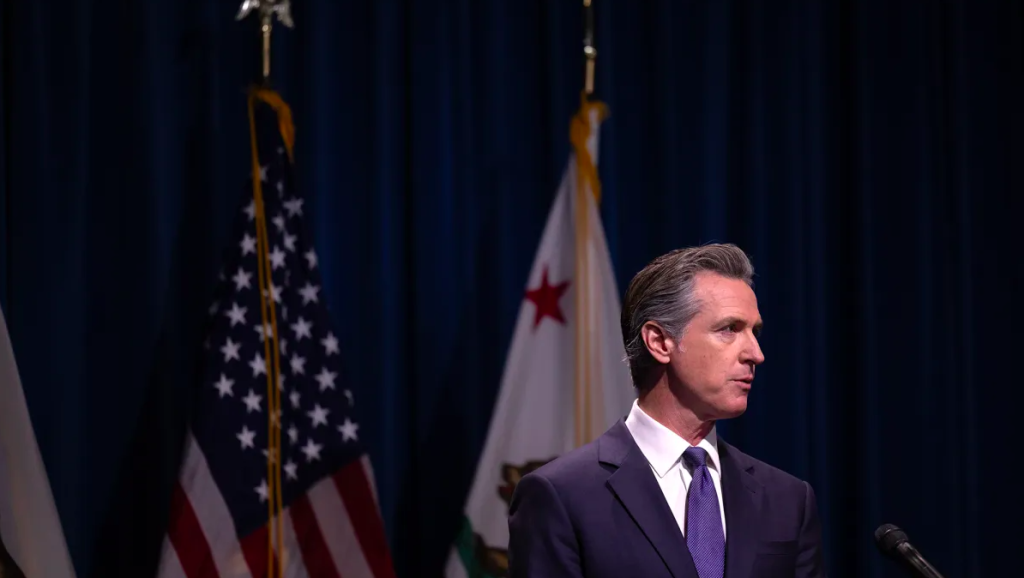
Join us Thursday, Feb. 8, from 10 a.m. to 11:30 a.m. for an informational webinar on Proposition 1. Voters will decide the outcome of Prop. 1 on the March 2024 ballot. Children Now and partners from the California Alliance of Child and Family Services, First 5 Association of California, and The Children’s Partnership will provide an overview of Prop. 1 and its implications on child- and youth- serving organizations. Interpretation and materials will be available in Spanish.
Speakers:
- Lishaun Francis, Senior Director of Behavioral Health Policy, Children Now
- Adrienne Shilton, Vice President of Public Policy and Strategy, California Alliance of Child and Family Services
- Courtney Armstrong, Director of Government Affairs, First 5 Association of California
- Angela M. Vázquez, Policy Director, The Children’s Partnership
Medi-Caid Feedback Loop Continues
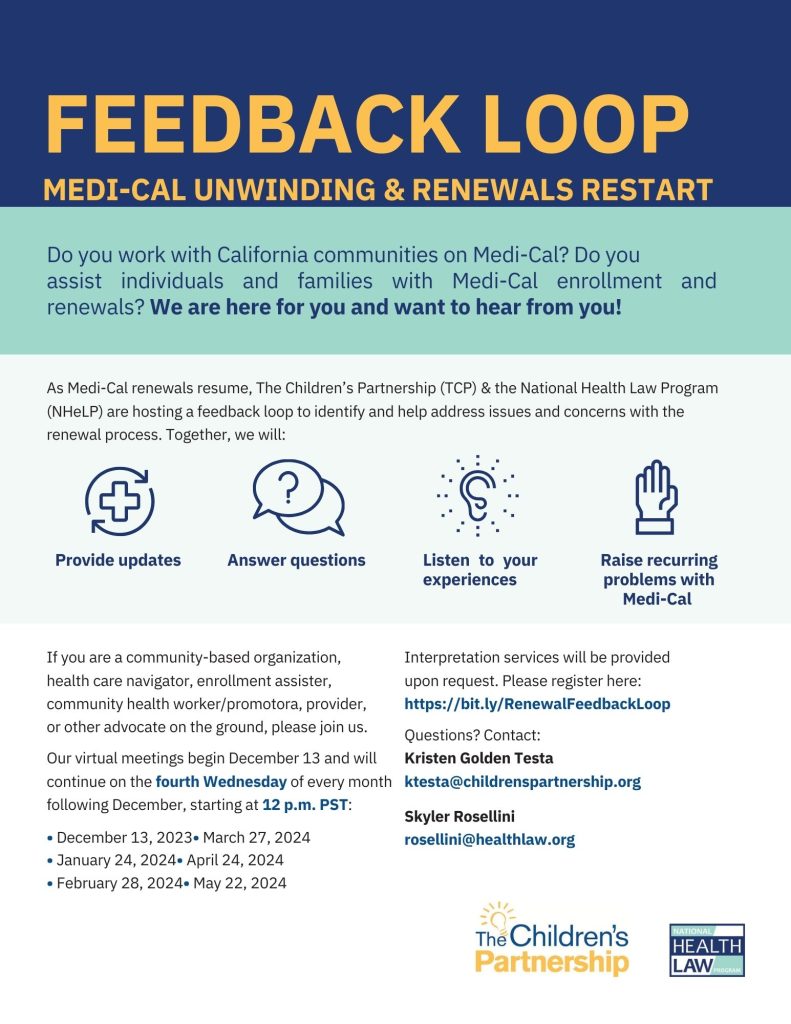
TCP and NHeLP continue the Medi-Cal renewal feedback loop with local organizations and navigators helping families in the Medi-Cal renewal process. We provide updates, answer questions, and bring attention to the Medi-Cal program issues raised by navigators, sharing their on-the-ground experiences with the Medi-Cal program. Assisters will also discuss best practices for overcoming challenges in the process.
Please share this monthly feedback loop opportunity with your partners, and join us on the fourth Wednesday of the month at noon. The next meeting will be held Feb. 28. See you there!

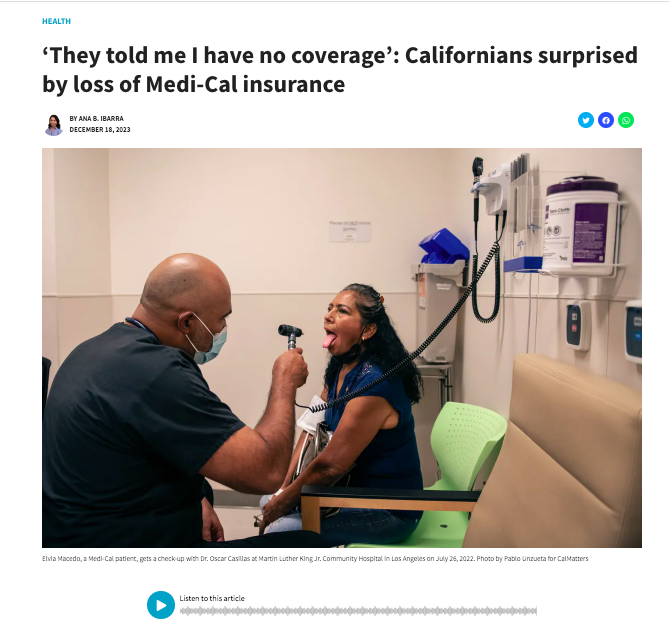
TCP research referenced by CalMatters
CalMatters cited a TCP report, “Impact of Gaps in Medi-Cal Coverage: Family Focus Group Findings,” in an article about the effects of the federal unwinding of continuous Medi-Cal coverage. The article was published in Spanish in The San Diego Union-Tribune and in Chinese in the World Journal.
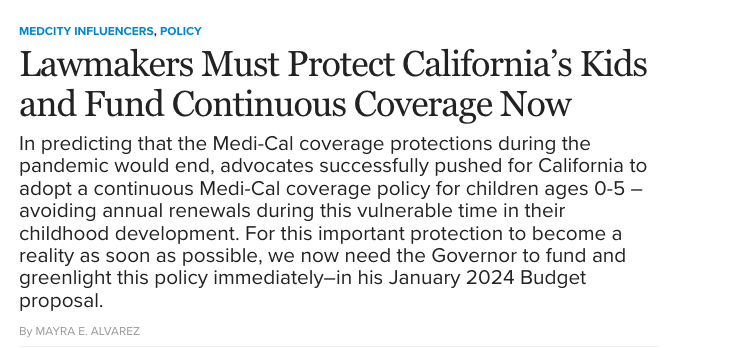
Mayra E. Alvarez urges CA to implement continuous coverage
MedCity News published an opinion piece by TCP President Mayra E. Alvarez on the importance of greenlighting and funding continuous Medi-Cal coverage for young children ages 0-5.
